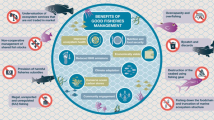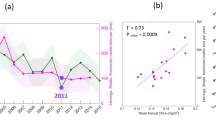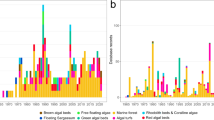Abstract
IN the autumn of 1921 there was a remarkable movement of water in the Atlantic, northwards and into the English Channel. This persisted into the early winter, and water temperature rose, though air and ground temperatures were falling1. No explanation has been given for this occurrence, nor has it happened since then to the same extent.
This is a preview of subscription content, access via your institution
Access options
Subscribe to this journal
Receive 51 print issues and online access
$199.00 per year
only $3.90 per issue
Buy this article
- Purchase on Springer Link
- Instant access to full article PDF
Prices may be subject to local taxes which are calculated during checkout
Similar content being viewed by others
References
Harvey, W. H., J. Marine Biol. Assoc., 13, 678–692 (1925).
Russell, F. S., Rapports Cons. internat, pour l'Expl. de la Mer, 100, 7–10 (1936).
Smithsonian Misc. Collections, 94, No. 10 (1935).
Private communication dated March 12, 1937.
Proc. Nat. Acad. Sci., 6, 674–78 (1920).
Ann. Astrophys. Obs. Smithsonian Inst., Washington, 4, 2 (1922).
Author information
Authors and Affiliations
Rights and permissions
About this article
Cite this article
ATKINS, W. British Fisheries, Phosphate and the Solar Radiation Constant. Nature 141, 77–78 (1938). https://doi.org/10.1038/141077b0
Published:
Issue Date:
DOI: https://doi.org/10.1038/141077b0
This article is cited by
Comments
By submitting a comment you agree to abide by our Terms and Community Guidelines. If you find something abusive or that does not comply with our terms or guidelines please flag it as inappropriate.



